Vauxhall Grandland 2022 review: upgrades add some star quality as PHEV impresses
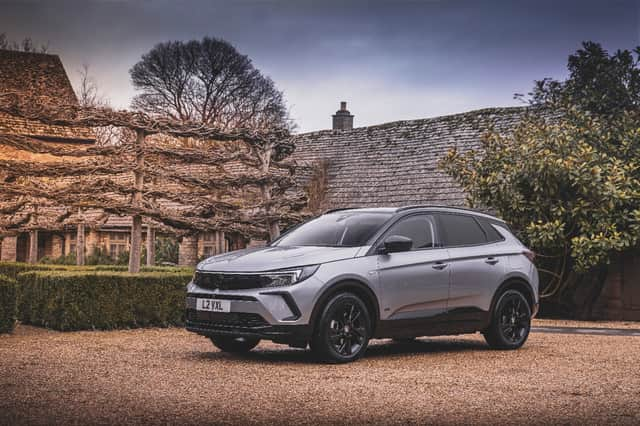

Competent, handsome enough and a bit dull, if the outgoing 2018 Vauxhall Grandland X had been plying its trade in Holywood the feedback from auditions would be: “we like you, but you’re just not a leading man”.
For the 2022 mid-life facelift, Vauxhall has dropped the X from the name, but sought to introduce a bit more X-factor to the design in the hope of enticing buyers in the ultra-competitive C-segment SUV market, where the Grandland is up against some high-performing rivals with plug-in hybrid variants like the Peugeot 3008, Ford Kuga as well as a steady stream of newcomers like the Suzuki Across.
Advertisement
Hide AdAdvertisement
Hide AdLargely successful, the visual upgrades add a touch of aggression to the front end with Vauxhall’s ‘Visor’ LED light cluster and grille design, larger air intakes, new alloy wheels, contrast roof and matte black text detail combining for a far more interesting look than its predecessor.
Even with this injection of character though, the Grandland is still more visually conservative than much of the competition. While it shares much of its DNA with the Stellantis-owned Peugeot 3008, it’s the less interesting looking sibling - the Luke Wilson to his megastar brother Owen or wee brother Liam to the Marvel hero Chris Hemsworth.
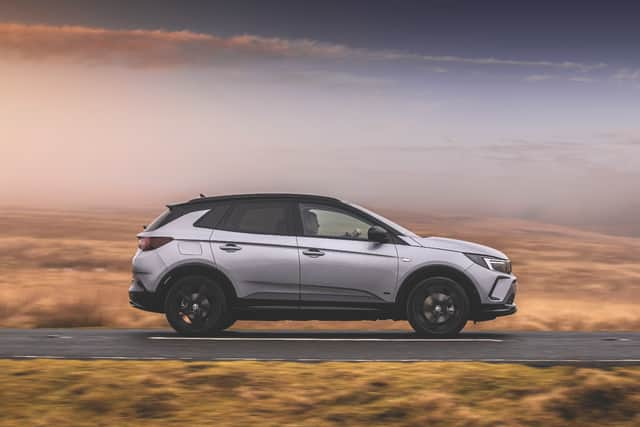

Simplified range
Suffering a hangover from previous practice under GM, the old Vauxhall range was often confusing to navigate with a vast array of options and variants within a model range. The current leadership has sought to simplify this and made a commitment that there be “no poor relations” in the range.
Last year a Grandland X buyer had a potential 27 derivatives to choose from once you factor in engine, transmission and trim options. The new model range is vastly simplified, with three engines to choose from – 1.2-litre turbocharged petrol, 1.6-litre Petrol PHEV and 1.5-litre diesel. The petrol engine can be paired with a six-speed manual transmission or an eight-speed automatic, while the PHEV and diesel engines are automatic transmission only. Vauxhall expects diesel’s market share to continue to diminish from the present 15 per cent and, with 60 per cent of diesel sales now automatic transmission, has opted to remove the option for a manual stick.
Advertisement
Hide AdAdvertisement
Hide AdWith three trim levels to choose from, Design, GS Line and Ultimate, the total number of derivatives in the 2022 Grandland range is now just 11. Even the entry-level Design trim is well equipped in terms of tech and safety equipment, with LED headlights, dual-zone climate control, soundproofed windscreen, automatic emergency braking and lane keep assist all included in the lengthy list of standard equipment. No poor relations indeed.
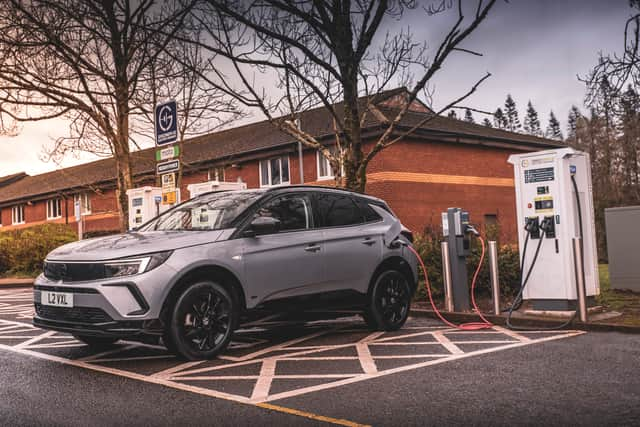

Even so, Vauxhall expects the entry-level specification to make up just 10 per cent of sales, with a 60/30 split between GS-Line and Ultimate.
Stepping stone to electrification
With a public-stated commitment to having an EV version of every car in the range by 2024 and being an EV-only manufacturer by 2028, we can assume that an electric-version of the Grandland is in the future release pipeline. In the meantime though, the brand believes in the importance of plug-in hybrid vehicles as having a part to play on the journey toward full electrification, both for customers and manufacturers.
Plug-in hybrid sales in the UK have been driven by business fleets and, falling in the 11 per cent BiK bracket (12 per cent from 1 April), the Grandland will likely be no exception. Vauxhall has worked hard on the value and cost of ownership proposition in the hope to attract a bigger share of retail customers. The 2022 Grandland PHEV is actually £3,995 less expensive than the outgoing version of the car. There are similar savings versus competitors such as the Volkswagen Tiguan PHEV, Ford Kuga PHEV and Kia Sportage PHEV models.
Advertisement
Hide AdAdvertisement
Hide AdResiduals versus the outgoing car are up five per cent and with current offers, the PHEV model can be had from £309 per month while the 1.2 petrol comes in at £299 per month on PCP.
Cabin and practicality
The Grandland’s cabin has always been spacious, but the updated model has been de-cluttered, with a greater emphasis on display screens and fewer buttons than before. GS-Line and above get a 10-inch touch screen infotainment display and a 12-inch digital instrument cluster, while entry-level Design models have smaller seven-inch displays for both the infotainment and instrument cluster.
There’s lots of black gloss plastic and chrome detail around the cabin and, once you get beyond the big touchscreens, you could be at the wheel of any higher-spec Vauxhall that’s rolled off the assembly line in the last ten years. Build quality and materials are absolutely...fine. Neither will trouble the premium market, but nor does this feel like a budget model.
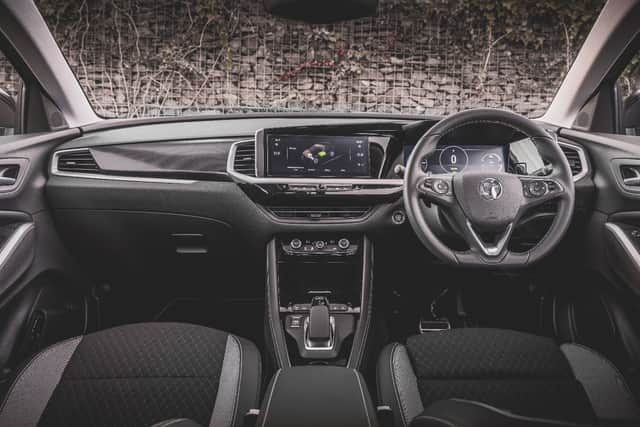

The seats, finished with Alcantara in Ultimate trim, are comfortable with a wide range of adjustment, something that will please high-mileage business drivers and frustrate their chiropractors. Unique to the segment they are certified by AGR, a German body that translates as the Campaign for Healthier Backs.
Advertisement
Hide AdAdvertisement
Hide AdRear leg room is reasonable for the class and rear passengers have decent headroom too. The hybrid battery position means compromised boot space and while the petrol and diesel models have 514 litres of space before the rear seats are folded down, this is reduced to 390 litres in the PHEV.
Driving characteristics
During the course of my test drive I spent time at the wheel of the 1.2-litre turbo with an automatic gearbox as well as the 1.6-litre PHEV. The automatic transmission was smooth paired with the more powerful hybrid powertrain, but less well suited to the smaller 128bhp petrol-only unit, feeling particularly laboured accelerating from a standing start. At cruise, both engines feel refined and comfortable with lazy acceleration and dabs of power alike.
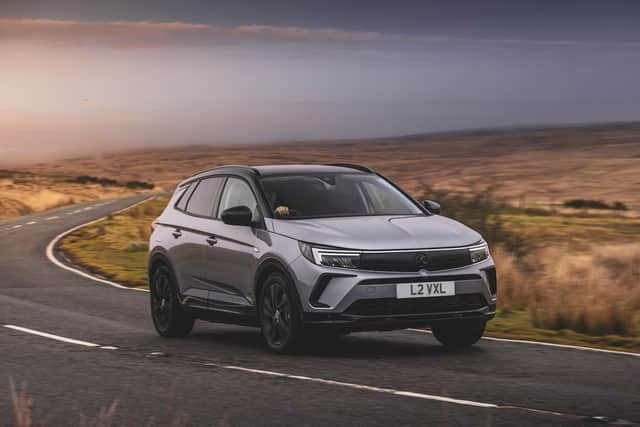

I’d expect the 1.2 to be more satisfying with a manual gearbox. The PHEV is, on the other hand, unsurprisingly the pick of the power plants available. With 222bhp from the combined petrol and electric motors available, an 8.9-second 0-60mph time seems a tad miserly, but power delivery was smooth and the Grandland PHEV is at home on the motorway, whichever lane you choose.
Slightly cumbersome under certain conditions, however, is a criticism I would level at it. While no pure driver’s car, it does handle competently enough on winding B-roads, with just a touch too much lean in the corners but otherwise, fine. Navigating small Cotswolds villages packed with parked SUVs, crossroads and traffic cones, the steering felt too stiff and more hard work than it ought to.
Advertisement
Hide AdAdvertisement
Hide AdWith up to 39 miles of EV only range you can run on battery power up to 84mph. Doing so, you’d run through that battery charge very quickly, however. The e-save set-up allows you to run the car on petrol-only power and only engage the battery when you want to, saving your battery range for when you’re driving in built-up areas or able to maximise efficiency. It’s a neat feature, but the UX is clunky, with about two too many buttons needing to be pressed in order to enable and disable the battery power.
Verdict - box office smash, or straight to VHS?
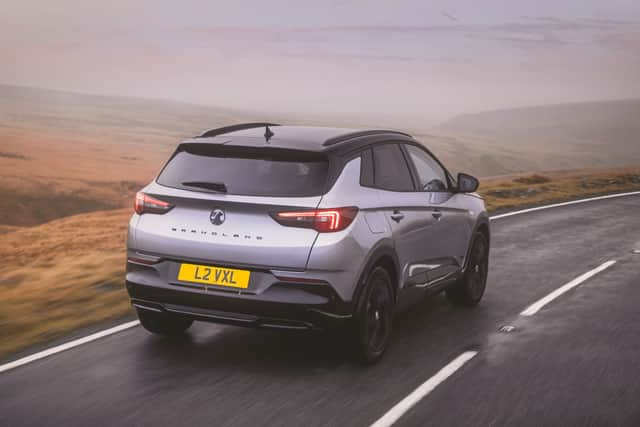

C-segment SUVs account for one in six cars sold, making it the biggest single class in the UK market and a hugely important one for a mainstream manufacturer like Vauxhall. The 2018 Grandland has sold more than 70k cars in the UK to date and, with better tech and strong levels of equipment, the 2022 model ought to be well placed to win more fans amongst business buyers. The competitive cost of ownership, safety rating and high tech should also appeal to mainstream purchasers, but the looks, while sharper, still don’t stand out enough in a competitive sector.
We’ll also have to wait until the arrival of the Stellantis STLA Medium platform before we see a fully electric Grandland and that will be late 2023 at the earliest. Whether the Grandland grows significant market share amongst retail buyers, for the time being, will depend on demand for the plug-in version offsetting the diminishing significance of ICE models in the new car market.
Vauxhall Grandland Plug-in Hybrid-e GS-Line
Price: £33,820; Engine: 1.6-litre, four-cylinder, petrol with 80kW electric motor; Power: 222bhp; Torque: 266lb ft; Transmission: Eight-speed automatic; Top speed: 140mph; 0-60mph: 8.9 seconds; Economy: 192mpg; CO2 emissions: 31g/km; EV range: 39 miles
Comment Guidelines
National World encourages reader discussion on our stories. User feedback, insights and back-and-forth exchanges add a rich layer of context to reporting. Please review our Community Guidelines before commenting.
